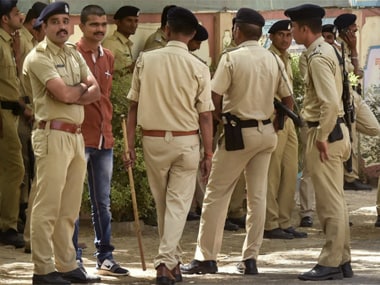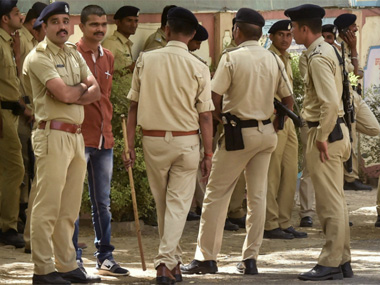On 5 November the controversial Gujarat Control of Terrorism and Organised Crime got the president’s nod in its fourth attempt. The anti-terror legislation has been receiving severe criticisms for its provisions which are described as an onslaught on established principles of criminal justice and the Constitution. Interestingly one of the key features of the new Act includes the consideration of intercepted telephonic conversation as legitimate evidence. The attempt to intercept calls by investigating agencies is a matter of great concern as it directly interferes with the constitutional right to privacy of an individual. The legislation gives free hand to an official in this regard.[caption id=“attachment_7667541” align=“alignleft” width=“380”]  Gujarat Police personnel. Image courtesy CNN-News18[/caption] The second issue is making the confessions to police official admissible as evidence departing from the established practice of criminal justice. Now the moot question is whether these provisions are sustainable in the light of established legal and constitutional principles. In RM Malkani V State of Maharashtra(1972) the apex court had held that interception of telephones is not violative of fundamental rights and evidence collected in such a way are admissible. However, in a recent case, the Bombay High Court observed that applying the jurisprudence of right to privacy judgment, any legislation interfering with the right to privacy will have to pass the proportionality test enunciated in the Puttaswamy case. As observed in the Right to Privacy judgment the fundamental right to privacy can only be curtailed by any law if they satisfy the test of proportionality and legitimacy. Puttaswamy judgment made it very clear that in case of infringement of fundamental rights it is not sufficient for the government to just cite law and order but those very laws and order must pass the multifold test of proportionality. Puttaswamy’s four-fold test requires the government to show firstly a legitimate aim, secondly a rational connection between the law and that aim (the court emphasized that the government must resort to least restrictive option to achieve that), thirdly it must be proportionate i.e., the benefits must outweigh the cost of infringing and lastly, there have to be procedural guarantees against abuse of government interference. Hence there must be a balancing effect in case any law infringes the fundamental rights. In the present case, the government will cite reasons for ‘public safety’ in order to justify the concerned provision of GUJCOCA. However, it must be kept in mind that recently the government has exploited the terms like ‘national security’, ‘public interest’ in its favour. It has been seen that the government goes ahead with its restrictions very smoothly after citing these reasons as justifications behind any law. Therefore it is the duty of the court to look into the prospective abuse of certain constitutional terms. Public safety and ‘national security’ are not blanket terms which can justify any arbitrariness resorted by the government. The ruling of the Supreme Court in PUCL v. Union of India (1997) is very relevant in this context. In this case, the Supreme Court defined public safety as “the state or condition of freedom from danger or risk for the people at large… [that would be] apparent to a reasonable person". Hence the outright authorisation of call interception is against constitutional principles. There might be certain cases wherein interests of public safety or national interest government might internet call but this can only be exercised very sparingly. Now the second issue is the provision regarding admissibility of confession to police as evidence. So far the practice of criminal justice has been that confession made to police officials are not admissible as evidence in courts. Section 25 of Indian Evidence act strictly bars that. The broad reasoning for the enactment of these sections was to prevent the practice of torture, extortion and oppression, which was rampantly employed by the police in order to extort confessions. Hence, they are based on the assumption that a confession made to the police officer may suffer from the impairment of want of genuineness, as there is a high degree of probability that the same was not voluntarily procured. Torture, fear, inducement, oppression are all seen as a means of undermining the reliability and credibility of confessions. Such confessions suspect. This principle of English Law focuses on the humanness of the means employed and is simultaneously effective in reaching the ends of delivering justice, by taking into consideration all voluntary confessions. In the times when the institutional legitimacy of the police is questioned widely such an unbridled empowered which potentially interferes with the liberty of an individual is a travesty of criminal justice. These concerns were reflected by Supreme Court in the case of Dagdu v. State of Maharashtra. The court observed that the archaic attempt to secure confessions by hook or by crook seems to be the be-all and end-all of the police investigation. The police should remember that confession may not always be a short cut to a solution. Instead of trying to “start” from a confession they should strive to “arrive” at it. Else, when they are busy on their short route to success, good evidence may disappear due to inattention to real clues. Once a confession is obtained, there is often flagging of zeal for a full and thorough investigation. Consequently, with a view to establishing the case, dehors the confession, later, being inadmissible for one reason or other, the case fails to make an impact in the court. The police authority itself, however, carefully controlled, carries a menace to those brought suddenly under its shadow and the law recognises and provides against the danger of such persons making incriminating confessions with the intention of placating authority and without regard to the truth of what they are saying. In this light, the provisions of GUJCOCA are legislative attempt to make Orwellian state which must be strictly checked and balanced to preserve the rule of law.
The police should remember that confession may not always be a short cut to a solution.
Advertisement
End of Article


)

)
)
)
)
)
)
)
)



